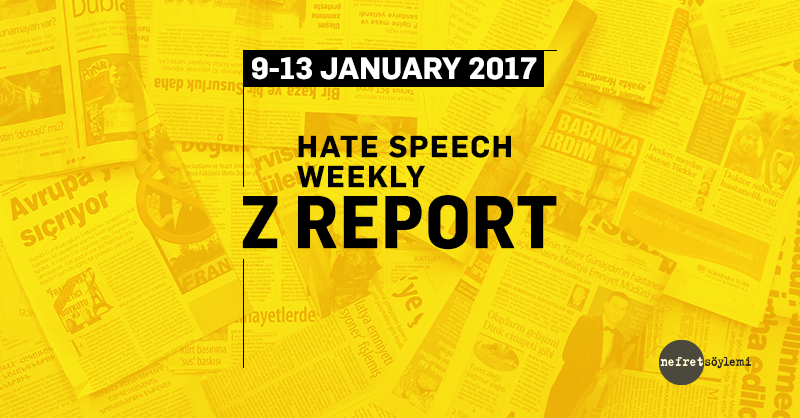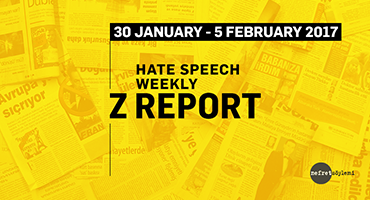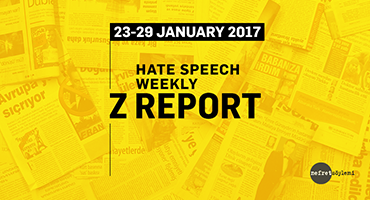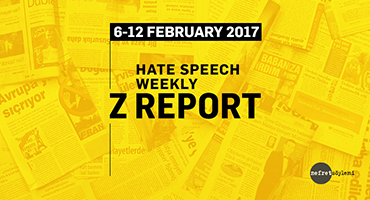As part of the “Media Watch on Hate Speech” project that has been carried out by Hrant Dink Foundation since 2009, we are systematically monitoring print media, scanning all national newspapers and about 500 local newspapers to detect hate speech against ethnic, national and religious identities. As of January 2017, every week we will publish 5 selected articles here with critical discourse analyses. With these selected articles, we aim to show the ways polarization and intolerance in the society are reflected in print media and media's role in spreading hate discourse. In this way, we hope to enhance the ground of discussion concerning the methods of combating discriminatory and racist discourse and to encourage media to use a more conscious and respectful language in terms of human rights.
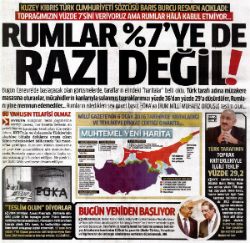
The article published in Milli Gazete on the front page with the title of “GREEKS DON'T ACCEPT 7%” and with the title of “Greek obstacle in Geneva” inside covers the talks which were held in Geneva on January with the participation of the leaders of southern and northern Cyprus. The newspaper marginalizes an ethnic group as such while criticizing state policies with the statements like the following: “We give 7% of our land, but Greeks still don't accept it” and “Maps of the both sides are revealed. The people negotiating on behalf of Turkish side dropped our land soaked with the blood of martyrs from 36% to 29%, but they cannot satisfy Greeks anyway. What Greeks demand is clear: surrender to EOKA (National Organisation of Cypriot Fighters)."
Besides, the newspaper defames Greeks by defining them as "insolent" and "spoiled": “While they are tolerating the insolent demands and spoiled behaviors of Greeks, they act like there is no other way than living together with Greeks." Greeks are also portrayed as a source of threat: "It is obvious what Greeks, who weren't satisfied by 7% land 12 years ago, demand from Turkey: surrender."
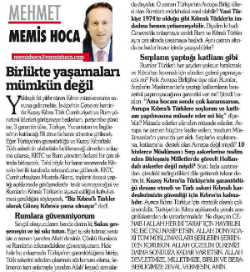
Mehmet Memiş Hoca, in his column titled "It is impossible to live together for them", discusses the talks that were held with the participation of leaders from southern and northern Cyprus and guarantor countries. Memiş Hoca criticizes the possibility of a federal system and claims that Greeks and Turks cannot live together. He labels Greek identity as a source of worry with "I don't trust Greeks" sub-title and the following statement: "Dear readers, don't get relax and just hang on. If you don't hang on, then you are going to invoke. I don't trust Greeks and the ones supporting them.”
Under the sub-title of “Like the massacre committed by Serbians”, the author writes: “Won't Greeks do whatever they can to dispossess Turks and chase them away from Cyprus? And how can we be sure that EU member Greeks won't massacre Muslims like Serbians did?” and “Europe has never supported wronged, oppressed Muslims. Wasn't it Europe which supported the genocide carried out by Serbians?” Thus, he identifies all Serbians with violence and massacre and reinforces negative feelings about them. Furthermore, though he doesn't emphasizes Christian identity, he indirectly targets Christians by drawing an opposition between Serbians and Muslims. Putting this possibility forward, he creates the perception that Greeks are the potential enemies of Turks; he spreads a discourse that jeopardizes equality and co-existence and escalates enmity between two peoples.

Aydınlık newspaper's article titled “Petition against Armenian terrorists” covers the statements of political scientist Oleg Kuznetsov on the petition concerning the Moscow bombings on January 8, 1977. Featuring Kuznetsov's words like “Armenian terrorists” and “Armenian murder”, the article starts with the following sentence: “Famous political scientist Oleg Kuznetsov answered the questions of Eurasia Diary concerning a petition campaign about the terrorist attacks carried out by Armenians 40 years ago. Stating that Armenian terrorism in Moscow is concealed, Oleg Kuznetsov said that Moscow should take steps about this issue.” The newspaper, with these statements and the title, covers an isolated event by highlighting and demonizing a particular identity. In this way, it associates Armenian identity with violence and strengthens a discourse that portrays Armenians as a source of threat.
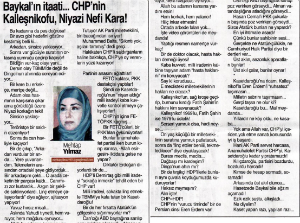
Mehtap Yılmaz, in her article titled “Obedience of Baykal... CHP's Kalashnikov Niyazi Nefi Kara”, marginalizes CHP, HDP and politicians in question with a provocative tone, while she is assessing the quarrel that took place during the voting of proposed constitutional amendments. Mostly targeting CHP MPs, Yılmaz keeps insulting Niyazi Nefi Kara with a sexist and provocative discourse: “A man confronts his opponent, but as you can see Niyazi is coward. He approaches sneakingly.” She also symbolizes Jewish identity by using it as a basis for insulting: “Actually, he acts like a Jew; he strikes, but acts like the victim.” She writes, “And they get mad when we consider them as the same with HDP”, “There is CHP that threatens the national will with “hitting the streets” like Demirtaş did!”, “They caused too much suffering to the party. They made it a puppet of FETÖ and supporter of PKK. CHP has FETÖPKK inside..”, and portrays the parties in question as enemies and circulates a very dangerous discourse that plays a part in intensifying polarization in the society.
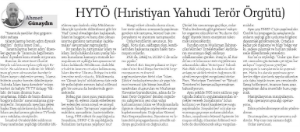
Ahmet Günaydın, in his column titled “HYTÖ (Christian/Jewish Terrorist Organization)”, criticizes the statements that had been made after Charlie Hebdo shooting and ISIS attacks like “discussions/statements/defences concerning Islam is a religion of tolerance and peace” and claims that such statements result in “the tacit acceptance of the pathetic psychology that Muslims are scapegoats” and states “from now on, Muslim theologians/scholars/intellectuals should focus on offense rather than defence.” He also writes, “It should be emphasized that there is Christian/Jewish western mind behind ISIS, El-Kaide and various terrorists organizations and this mind cannot be considered independently of religious mentality and dogmas. Yes, I am talking about conceptualizing 'Christian terrorism' and 'Jewish terrorism'.” With these statements, he claims that Christians and Jews are terrorizing the world. The author reinforces the common prejudices against Christians and Jews, marginalizes them and circulates a dangerous war discourse between the lines.

